NCERT Solutions Class 7 Science Chapter 14 Electric Current and its Effects
Q.1.Draw in your notebook the symbols to represent the following components of electrical circuits: connecting wires, switch in the ‘OFF’ position, bulb, cell, switch in the ‘ON’ position and battery.
Ans.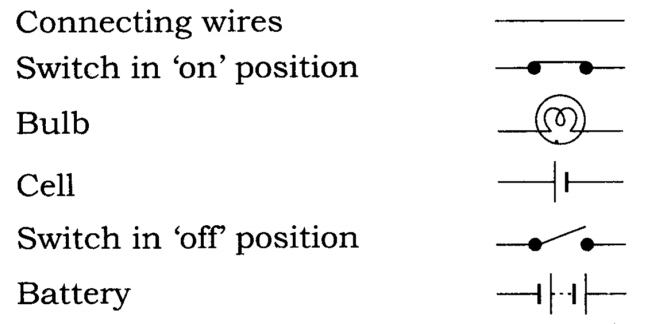
Q.2.Draw the circuit diagram to represent the circuit shown in fig. 14.9.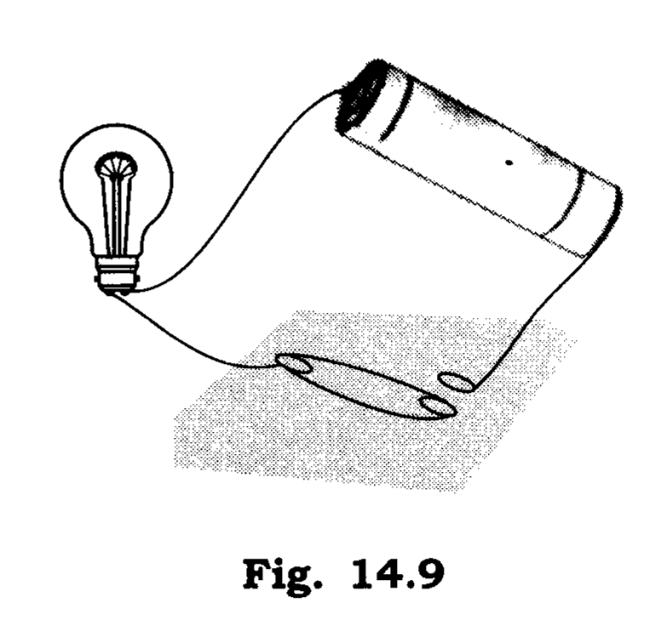
Ans.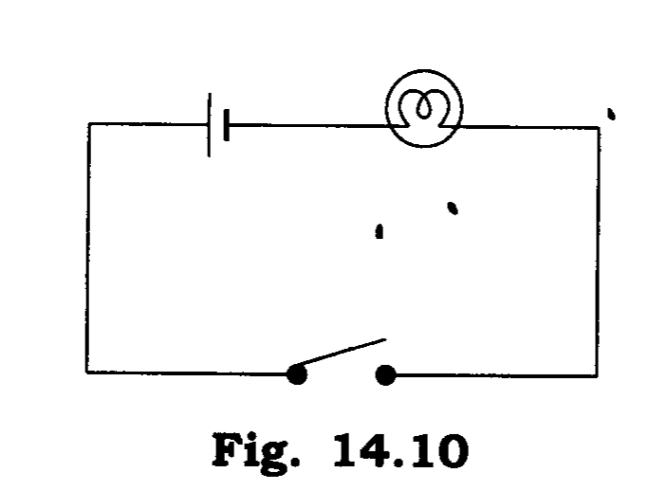
Q.3.Fig. 14.11 shows four cells fixed on a board. Draw lines to indicate how you will connect their terminals with wires to make a battery of four cells.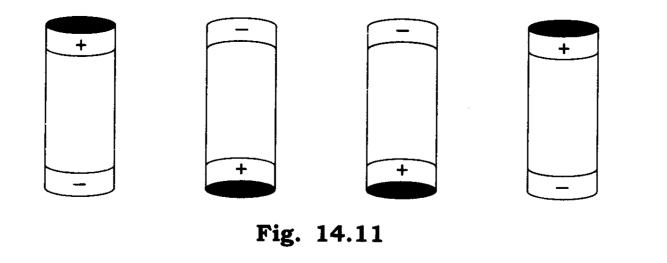
Ans.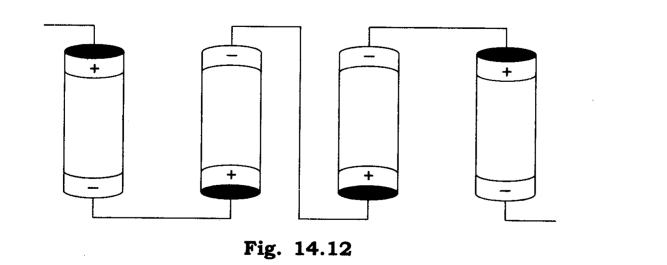
Q.4.The bulb in the circuit shown in fig. 14.13 does not glow. Can you identify the problem? Make necessary changes in the circuit to make the bulb glow.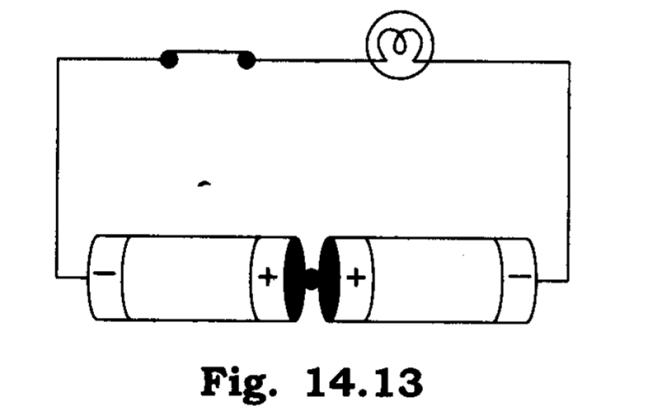
Ans.Problem in this circuit is the combination of two cells. In the circuit positive terminal of one cell should be connected with negative terminal of other to make the bulb glow
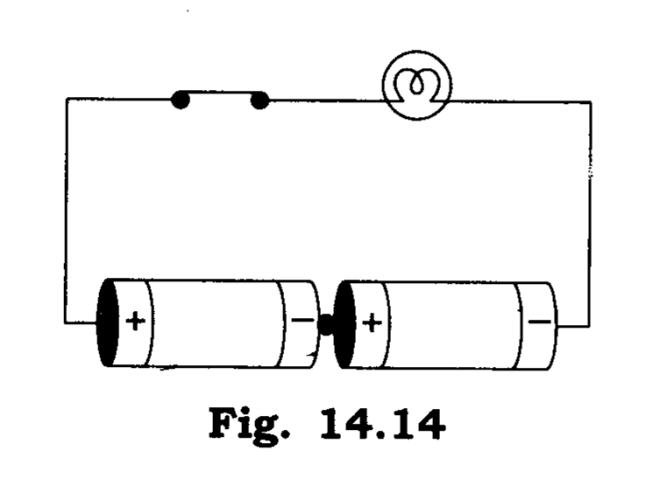
Q.5. Name any two effects of electric current.
Ans. Electric current has the following effect :
(i) Electric current can give rise to heating and lighting.
(ii) Electric current can convert a straight conductor into a temporary magnet.
Q.6.When the current is switched on through a wire, a compass needle kept nearby gets deflected from its north-south position. Explain.
Ans. When current is passed through the wire, it deflects the compass near it from its north-south position like a magnet. This is called magnetic effect of the current. As we know that needle of the compass is made up of a thin magnet. When this needle comes in contact with another magnet then the like poles of the magnet repel each other and opposite poles attract each other. So the deflection is seen in the needle. In this case the wire behaves like a magnet and causes deflection in needle of the compass.
Q.7.Will the compass needle show deflection when the switch in the circuit shown by fig. 14.15 is closed?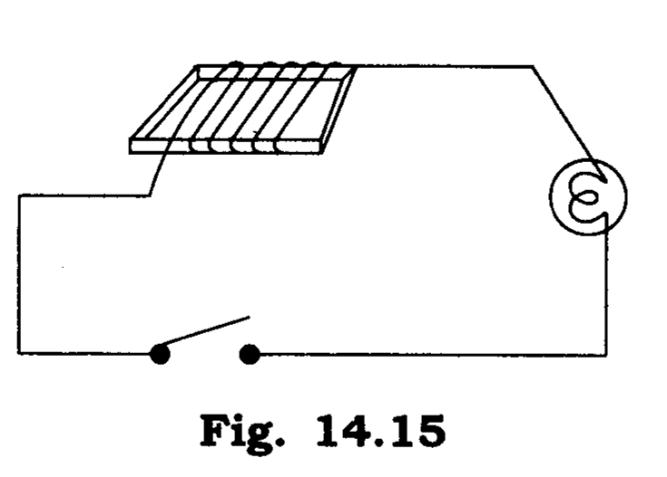
Ans. No, because there is no source of electric current in this circuit, i.e., there is no battery.
Q.8.Fill in the blanks:
(a) Longer line in the symbol for a cell represents its ___________terminal
(b) The combination of two or more cells is called a ____________.
(c) When current is switched ‘on’ in a room heater, it ___________.
(d) The safety device based on the heating effect of electric current is called a _____________.
Ans.(a) positive (b) battery (c) becomes red hot and emits heat (d) fuse.
Q.9.Mark ‘T’ if the statement is true and ‘F’ it is a false:
(a) To make a battery of two cells, the negative terminal of one cell is connected to the negative terminal of the other cell. [T/F]
(b) When the electric current through the fuse exceeds a certain limit , the fuse wire melts and breaks. [T/F]
(c) An electromagnet does not aatract a piece of iron. [T/F]
(d) An electric bell has an electromagnet. [T/F]
Ans. (a) F (b) T (c) F (d) T
Q.10. Do you think an electromagnet can be used for separating plastic bags from a garbage heap? Explain.
Ans. No, the plastic bags do not get attracted by the magnet, so they cannot be separated by an electromagnet. Plastic bags are not magnetic materials, only magnetic materials like iron can be attracted by the magnet.
Q.ll. An electrician is carrying out some repairs in your house. He wants to replace a fuse by a piece of wire. Would you agree? Give reasons for your response.
Ans. No, we would not agree to allow to replace the fuse by a wire. Wires in the fuses are of specific melting points. So wd should always use ISI marked fuses in our houses to prevent short circuits.
Q.12.Zubeda made an electric circuit using a cell holder shown in fig. 14.16, a switch and a bulb. When she put the switch in the ‘ON’ position, the bulb did not glow. Help Zubeda in identifying the possible defects in the circuit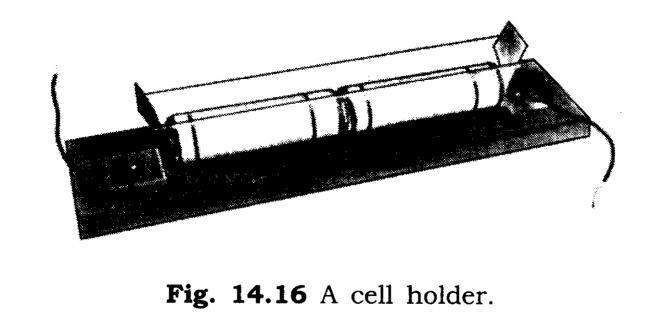
Ans. It is important to put the cells in right series. The positive terminal of the first cell should be connected with negative terminal of the second cell. The switch should be closed properly and bulb should not be fused. If Zubeda will check these then the bulb will certainly glow.
Q.13. In the circuit shown in fig. 14.17.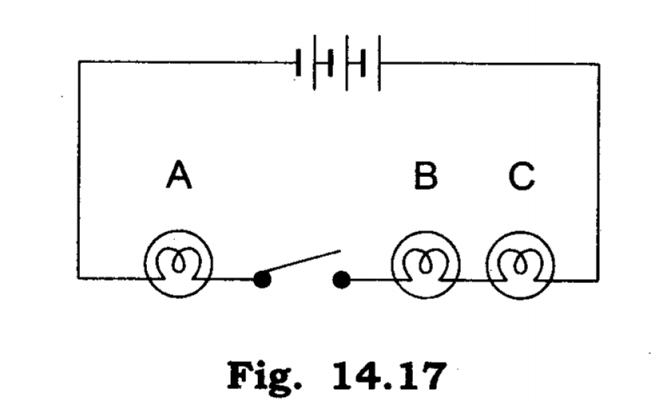
Would any of the bulb glow when the switch is in the ‘OFF’ position?
What will be the order in which the bulbs A, B and C will glow when the switch is moved to the ‘ON’ position?
Ans. No bulb will glow.
All bulbs will glow simultaneously.